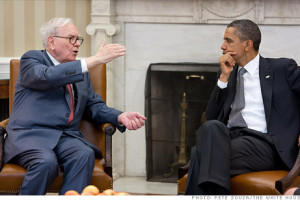Why Buffett doesn’t Rule

President Obama has travelled the country touting “the Buffett Rule” seeking to ensure that certain individuals over an arbitrary threshold pay more taxes than they are currently paying.
The common example being used throughout this push to segregate the nation has been to compare Warren Buffett, investor extraordinaire, with his secretary. This example is driven by the fact that Buffett’s effective tax rate is lower than that of his secretary. However, the circumstances that create an effective tax rate are far different than paying taxes.
Warren Buffett pays A LOT of pure taxes in dollars. What Warren Buffett also does is make A LOT of money. When his large dollar amount of taxes is compared to his income, the percentage approaches 15%. Why is this? Well, Warren Buffett does not earn most of his money from a salary, or a form of ordinary income. Instead, Buffett earns much of his money from investment income. Investment income is taxed secondarily.
Why is there a difference in ordinary and investment income? Simple. Ordinary income is being taxed for the first time. When someone earns a salary, it gets taxed. First instance.
If someone takes the money they have left over after it has been taxed and invests it, there is an opportunity for them to make more money. Sometimes they will lose this investment and have nothing to tax. If the person is lucky enough to make more money on the investment, the government has identified an opportunity to take the individual’s earnings a second time. This investment income is taxed at a lower rate, currently 15%, than the ordinary income was.
The example touted by President Obama compares Apples and Oranges. Mr. Buffett’s secretary’s taxes being discussed are ordinary income. She is being taxed once. Mr. Buffett’s own income is being taxed two times.
The reason Buffett, and, say, Mitt Romney, have a low effective tax rate, is because they have been fortunate and worked hard enough to have substantial investments. They do not rely on salaries to manage the lifestyles they lead. Are they taxed at a rate commensurate with their secretaries? Absolutely. For their roles where they make ordinary income in the form of salaries, as earners in the top tax bracket, they will be taxed at 35% or greater. This rate is an Apple to compare to a secretary’s salary which may be taxed at 25% or 30% (or as Mr. Buffett’s secretary earns enough to put her in the country’s Top 1%, possibly even more). This, folks, is apples to apples.
Do not be fooled by the tomfoolery you hear on the news from the mouth of your David Blaine wanna-be President. As he pulls an Apple out of his right hand (ordinary income taxes) and compares it with an Orange in his left hand (investment income taxes), he is doing you a disservice.
The idea that there is a need to raise investment income tax rates is another Obama-nation (my own way of referencing frequent “abominations” coming from the White House since 2009). You have already been taxed at a substantial rate on the money you have earned. You do not need to be taxed again.
The government is not hurting from the multi-millions it is receiving from investment income taxes (read: taxing a second time) it gets every year from those like Buffett and Romney.
Unless you desire to have your money taxed multiple times (or even more than it is already), then there is no need for a Buffett Rule.